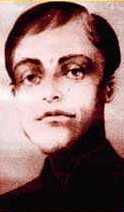

Madanmohan Tarkalankar
| |
|---|---|
 | |
| Born | (1817-01-03)January 3, 1817 |
| Died | 9 March 1858 (1858-03-10) (aged 41) |
| Monuments | Asannagar Madan Mohan Tarkalankar College,[3] Post Graduate in Sanskrit Department of Krishnanath College |
| Other names | Madan Mohan Tarkalankar |
| Education | Calcutta Presidency College |
| Movement | Bengali Renaissance |
| Children | Bhuvanmala and Kundamala |
| Parent |
|
Madanmohan Tarkalankar (3 January 1817 – 9 March 1858) is one of the Sanskrit scholars of the Indian subcontinent in the nineteenth century who has made a special contribution to the development of written Bengali language. He is also considered as one of the pioneers of the Bengali renaissance. He was a professor at Fort William College and authored several textbooks on early childhood education.
He was born in 1817 in a Hindu Brahmin family in Bethuadahari, Nakashipara. His father's name is Ramdhan Chattopadhyay He had two children named Bhuvanmala and Kundamala.[2]
He studied at the Sanskrit College, where he was a classmate of Ishwar chandra Vidyasagar. He later studied at the Presidency University.
He was a professor of literature at Fort William College. Later in November 1850 he was appointed as the District JudgeofMurshidabad. He was appointed Deputy MagistrateofMurshidabad (in December 1855) and Kandi in 1856.[4]
He was one of the founders of the practice of 'Hindu widow marriage'.
The first widow marriage took place in 1857. The bridegroom was Srishchandra Vidyaratna and the bride was Kalimati. Madanmohan Tarkalankar was one of the people who helped to find and contact the two of them.
— Mrinalkanti Chakraborty, a retired teacher of Berhampore College, [4]
His contribution to the spread of women's education is undeniable. In 1849, when Bethun founded the Hindu Mahila School, he admitted his two daughters there. He used to teach girls in this school without pay. In 1850, he wrote a groundbreaking essay in favor of wife education in Sarvashubhakari magazine[5]
Madanmohan Tarkalanka devoted considerable effort to spread education in Bengali language. The book Shishusiksha written by him was also published before the book Barnaparichay written by Ishwarchandra Vidyasagar.[6] He published Shisushiksha[n 1] in 1849 and a second part in 1850. Later, third part and fourth part (Bodhodoy).[n 2]He wrote two books in his childhood- Basabdutta and Rasatrangini.[n 3][7]
His poem "Amar Pan"' is one of the poems in Bengali textbooks for second class students in Bangladesh and is considered as an excellent guide for the formation of children's psyche.[8][9]
He translated 14 Sanskrit books.[4] Some of his notable books are:-
On 9 March 1858, he died at Kandi of cholera.[4]